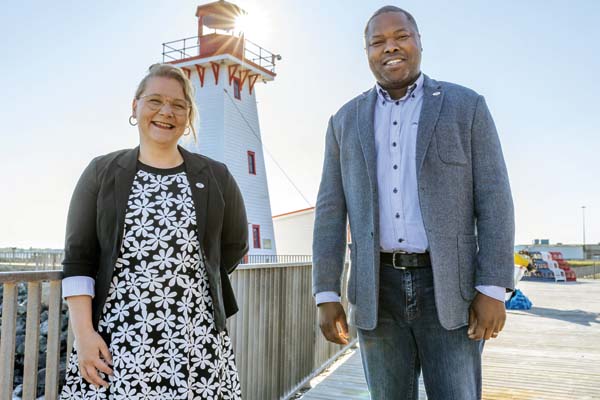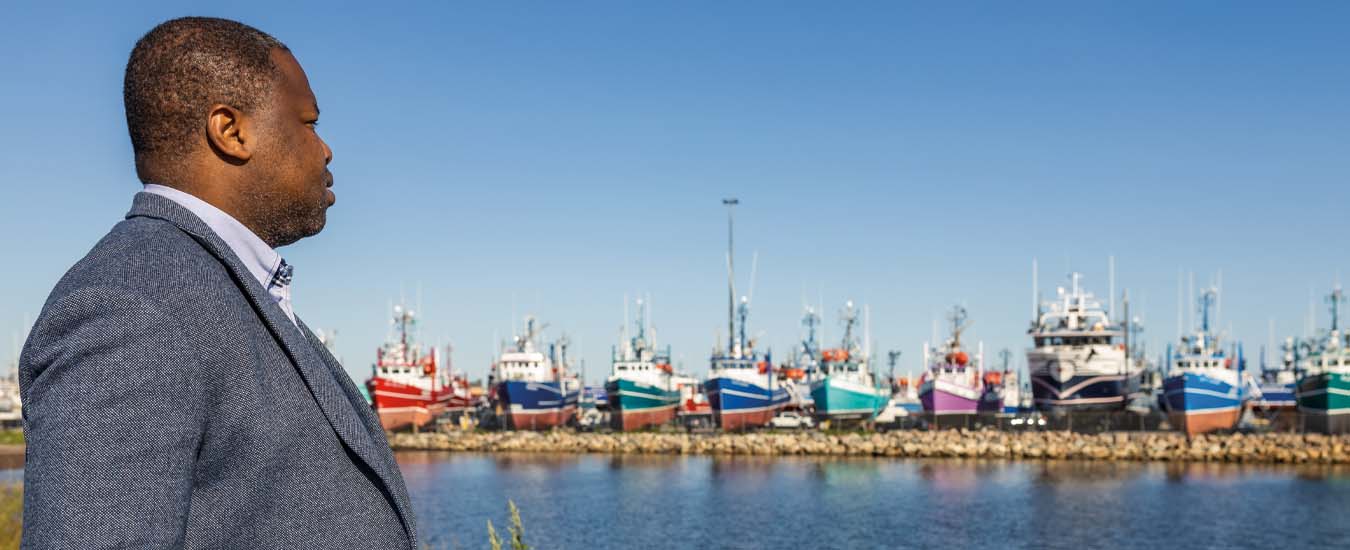Shippagan’s new mayor Kassim Doumbia won’t rest until his adopted town is as youthful, energetic and straight-up cool as he is
If he closes his eyes and tries hard, Kassim Doumbia might just see the moist, broadleaf forests of Ivory Coast, where he was born. He might imagine the rolling, sandy plains of Senegal, where he was raised, and the sound of West African French bouncing through busy market squares.
More likely, though, he has his eyes wide open and what he actually sees is the Acadian Peninsula town of Shippagan, where 2,600 people make their daily bread. And what he notes, with quiet satisfaction, is the growing social, cultural, and economic diversity that seems to be everywhere. He has to. He’s the mayor.
On May 25, Doumbia—who has lived and worked here since 2007—made headlines. With 55.16 per cent of the vote during an election that recorded an unprecedentedly high 62 per cent turnout, he became the only Black man in the community’s history to earn its highest electoral office; the only Black man to hold any office of this kind anywhere in New Brunswick. Ever.
“This is a dream come true,” he told a reporter for the Globe and Mail. To Global News, he quipped: “The United States got Obama. Shippagan got me.”
In fact, there was something extraordinary about all of this. But it wasn’t his skin colour or heritage. Somehow, this new Acadian had managed to convince enough established ones that decades of booms, busts, pogey, and poverty were not their inevitable lot in life; that they could become, maybe for the first time, whatever they wanted to be on whichever terms they wanted to set.
“I don’t think it’s possible to understate the importance of what just happened here,” says Donald Savoie, the Canada Research Chair in Public Administration and Governance at the Université de Moncton—an Acadian New Brunswicker who was born three hours by car from Shippagan in the similarly rustic Saint-Édouard-de-Kent. “For decades, the only thing that wasn’t leaving in desperation was an ageing population.”
Now, standing in stark contrast, was Doumbia, who spoke glowingly about local jobs, ventures, neighbours, friends, schools. A member of a cohort of ambitious, educated immigrants from all over the world encouraged by generous federal and provincial policies to settle on the Acadian Peninsula, he wasn’t about to go away.

Deputy mayor Mary-Lou Noel with “Hizzoner” Kassim Doumbia near the Old Portage Island lighthouse in Shippagan.
For that reason alone, Savoie says, Kassim’s election was the final test of a profound transformation that’s been underway everywhere in this historically conservative region. “It was part of a movement that you can see in the politics, in businesses, in the schools. It was the evidence of real change.” Marie-Lou Noel, Shippagan’s deputy mayor who has known her new boss for years, goes even further: “It was the proof.”
For the 41-year-old Doumbia, of course, the real proof will be in the social, cultural and economic development pudding he’s agreed to spend the next four years of his life as mayor tenderly and lovingly stirring. But he’ll take the compliment. “I am very happy that people are willing to come to this region,” he says. “We also have to make sure that those people decide to stay. We have to make sure that we have affordable housing for them in our community. We need new businesses and entrepreneurs. And, maybe most important, we really have to start listening to our youth. What do we have for them? When they go away to school or university or other places to work, we want them to come back.”
His reasons, it’s fair to say, are not just practical; they’re also poignant. When he left his own family in Africa to study computer science at Université de Moncton in 2000, he was only 20—a stranger in what was for him a truly strange land. “I was really close to my mom growing up,” he says. “It was a pretty big family; there were six of us. Before I left, someone gave me good advice. It was that I have to make sure to get involved at university and make friends, because the friends that I make along the way will someday hire me. So, I started volunteering and getting involved in different organizations.”
He worked as an intern at the Greater Moncton Chamber of Commerce and continued to rub elbows while earning an MBA from UdeM. “I had to get out there in the community, to get involved in the Chamber of Commerce with the youth so that I could meet more people. If I wanted to be in the community, then I had to really get to know it—be a part of it, get feedback from it—before I could contribute to it, before it could give anything back to me.”
He married Karine, a woman he met at university. They moved to Shippagan in 2007 to be closer to her parents. “I think we now know that it is important to have newcomers,” he says in a way that makes you think he’s spent many hours arguing the point. “Back in the day, there were a lot of comments that newcomers were coming here to get people’s jobs. We see even now that we have some entrepreneurs who are looking to retire, but they have with no succession plans. And we still have people coming in to visit our region who really want to get involved, but don’t or can’t.”
He doesn’t have to dig deep to explain how that feels. “When I first arrived in the region, there were no settlement agencies to help you navigate anything,” he told the Globe reporter after his election victory in May. “I had to do that all by myself, so I know the struggles people can face.”
In 2010, the year his first daughter was born (his second came along two years later), he took a job working for then-Lamèque-Shippagan-Miscou MLA Paul Robichaud, and helped create the province’s first welcoming centre for new immigrants. Eventually, he became supervisor of housing programs and services for the Ministry of Social Development in the province—a position he still holds.
There, according to a writeup by the New Brunswick Multicultural Council, where he serves as secretary, he “oversees a team of 12 people who work to improve the living conditions of low and middle-income families and individuals by providing affordable housing by administering programs focused on the development of healthy and sustainable living environments.”
Apart from being “committed to helping his community thrive, to embrace diversity, and to grow,” he is also chair of the board of directors of the Committee of Reception, Integration, and Settlement of Newcomers of the Acadian Peninsula, a member of the board of governors of the University of Moncton, and vice-chair of the community committee of Uni Coopération Financière.
He is, in other words, “involved”; just as his friend in Africa told him to be so many formative years ago. And it shows, even through the marketing mumbo-jumbo every mayor of every small town must—as an obligation of office—provide on his comunity’s website to entice potential visitors, tourists, investors and, just possibly new residents.
“Shippagan offers a picturesque living environment with many charms and which is recognized for its magnificent shots,” he says.
“Shippagan is a welcoming, inclusive city, open to other cultures and which has all the necessary infrastructures allowing young people, families, retirees and seniors to fully develop there,” he says.
“Shippagan is full of seasoned and visionary entrepreneurs who deliver goods and services locally, provincially, nationally and internationally,” he says.
“Shippagan is a city turned towards the future which aims to be a leader in sustainable development and that of active transportation,” he says.
Or, he says, it will be.
Through Doumbia’s eyes, Shippagan and the Acadian Peninsula it shares with the communities of Lameque, Miscou Island, Caraquet, and Tracadie-Sheila, among others, are diamonds in the rough. Sure, businesses have blossomed and withered in turn, and government jobs have come and gone. But it’s rich in history, and its survival skills are practically unparalleled. There’s more here beyond the doomsaying.
David Campbell, New Brunswick’s former chief economist, tends to agree. In a report he prepared for the Multicultural Council in 2018, he said, “The Acadian Peninsula plays an important role in the New Brunswick economy. It is a main hub for the province’s fishing and seafood processing industries. There are [more than] a dozen seafood processing operations, employing 2,300 people, and another 2,000 employed directly in the fishing sector. In recent years it has become one of the top wild blueberry producing regions in North America. At the time of the 2016 Census, 500 people were employed on farms in the region.”
In fact, he continued, “Without the Acadian Peninsula, New Brunswick would lose an important fishing, agriculture and manufacturing region. There are more than 3,000 businesses, including 100 in manufacturing, over 100 in transportation and warehousing, and 17 in seafood product preparation and packaging. There are also 14 recreational vehicle (RV) parks and campgrounds.”
At the same time, he warned, “In order to ensure the Acadian Peninsula continues to thrive, there will need to be a robust ‘talent pipeline’ to support the region’s important industries. Otherwise, business investment will slowly leave the region and dampen key sectors such as fishing, tourism and seafood processing… Boosting the number of immigrants to the [region] will ensure important industries have the workers they need; help rebuild the K-12 student population; and boost the local economy through increased household spending.”
All of which was what moved Doumbia into local politics in the first place. He won a seat on council in 2012. Re-elected four years later, he became deputy mayor. “When I was still working with Paul Robichaud, I saw a lot of challenges in the community and I wanted to do something more about it,” he says. “I knew I needed to become involved at the municipal level.”
Marie-Lou Noel, who shares many of his civic priorities, is glad he did.
What sets him apart, she says, is his intelligence and curiosity. And that makes him an ideal ambassador of the kind of opportunities for housing, entrepreneurs and young people he espouses. “Kassim is part of the change, but he also is the change as mayor.”
Now that he rules that particular roost, the real work begins. How it takes shape is still an open question, even to him. “I just want to be visible in the community,” he says. “I want to be part of the community. If I want to make something happen, or make a difference or move anything forward, I have to stay involved. We’ll see.”
What is crystal clear, however, is that his historic win at the polls has shaken the political complacence of an entire province, where some pundits may still wonder where the heck Kassim Doumbia thinks he is—so far away from the broadleaf forests of Ivory Coast, where he was born, and the sandy plains of Senegal, where he was raised.
Of all the questions “hizzoner” is now likely to face during his term of office, that’s an easy one. He thinks he’s somewhere between Pointe-Brûlée Street and the New Brunswick Aquarium and Marine Center. He thinks he’s lounging against a lobster trap next to the Old Portage Lighthouse. He thinks he’s taking stroll along the Shore Trail. He thinks he’s at the edge of victory, and the brink of disaster.
If he closes his eyes and tries hard, Doumbia thinks he’s home. And he is.
